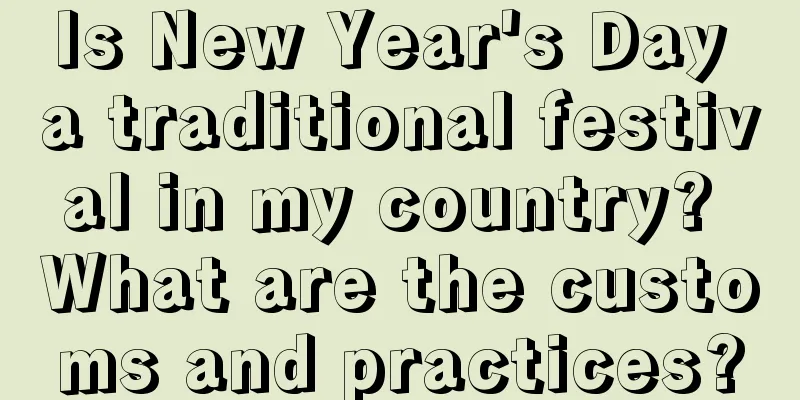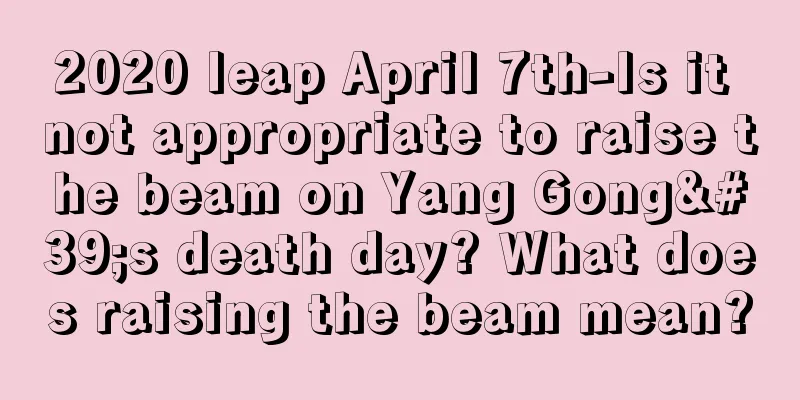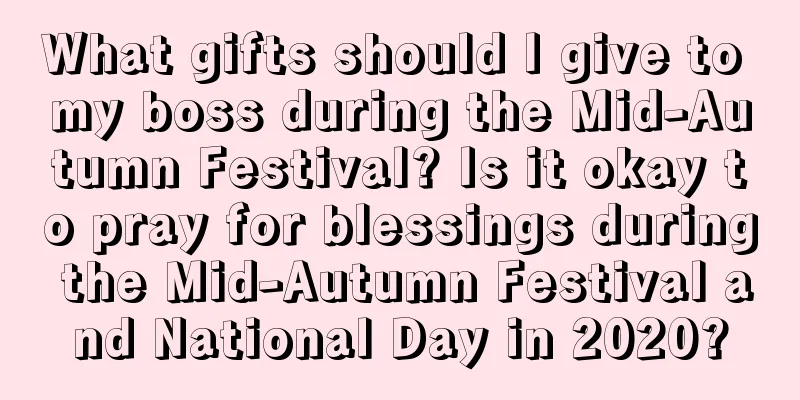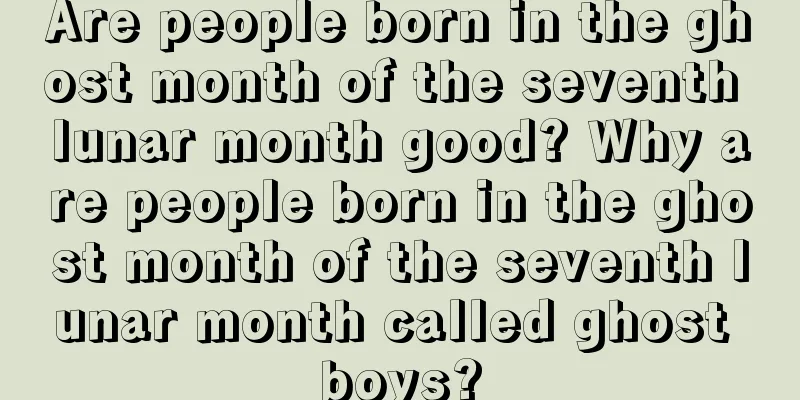Is New Year's Day a traditional festival in my country? What are the customs and practices?

When talking about New Year's Day, many people compare it with the Spring Festival on the first day of the first lunar month. Well, the Spring Festival is definitely a traditional festival in my country, but is New Year's Day also a traditional festival in my country? What are the customs and practices? The eleventh month of the lunar calendar heralds the arrival of the new year. The fortunes of each day are different. Please follow Mr. Shui Mo's website to check the lunar calendar information for the eleventh month of the lunar calendar in 2021!Is New Year’s Day a traditional festival in my country?New Year's Day is not a traditional festival in our country.New Year's Day, which is January 1st of the Gregorian calendar, is called "New Year" in most countries in the world. Due to the differences in history, culture, religious beliefs and national customs among countries and regions, each country and region has its own customs of celebrating the New Year and spending New Year's Day. Because countries around the world are located at different longitudes and have different times, the date of "New Year's Day" is also different. Yuan means "beginning", the beginning of a number is called "yuan"; "dan" means "day"; "yuandan" means "the beginning day". New Year's Day is also called "Sanyuan", which means the beginning of year, month and time. In China, New Year's Day was born during the Republic of China period and evolved from the Spring Festival. What are the customs and practices for New Year’s Day?The customs of celebrating New Year's Day in contemporary China are relatively simple. Generally, people put up slogans saying "Happy New Year's Day" and go out with their families to have a big meal at night to celebrate the coming of the new year. The specific customs need to be understood according to the characteristics of each place.Northern customs: The weather in northern my country is cold in winter, with short days and long nights. Starting from New Year's Day, people who are not busy on the farm would slaughter pigs and sheep, sit cross-legged on the earthen kang, and chat about family matters. They would not work or go out, and the process would end on the fifteenth day of the first lunar month. Due to the cold weather, the New Year's Day diet in Northeast China mainly consists of frozen foods, pickled vegetables, and stews. Frozen dumplings, sauerkraut stewed with vermicelli, pickled snow mustard greens, etc. are all must-have foods for New Year's Day. Children in the north eat candied haws during the New Year, which symbolizes a prosperous new year. In terms of culture and customs: Yangko dancing, stilt walking, and Northeast Errenzhuan will all be performed in succession at the temple fair. In Tianjin, people are busy cutting window flowers, pasting couplets, and engaging in a myriad of other cultural and entertainment activities. On New Year's Day, students in Shandong burn incense and worship the statue of Confucius in the hope of getting their names on the imperial examinations next year. Southern customs: In the Jiangsu and Zhejiang areas, bamboo poles are tied to grass and set on fire during New Year's Day, which is called "celebrating the silkworms in the fields." On New Year's Day in Shaoxing, guests are entertained with "tea bowl tea", and some people also put olives and kumquats in it, which is called "holding ingots". In Fujian, the Minnan pronunciation of "spring" and "leftover" is the same. When eating on New Year's Day, people put flowers made of red paper on the rice, which is commonly known as "spring rice". Spring dinner is a symbol of "abundance every year". In Guangdong, when paying New Year’s greetings on New Year’s Day, the elders will give red envelopes or tangerines to the younger generations as rewards, which is also a symbol of good luck and surplus in the coming year. What does New Year's Day mean in ancient times?In China, New Year's Day is said to have originated from Zhuanxu, one of the Three Sovereigns and Five Emperors, and has a history of more than 5,000 years. The word "New Year's Day" first appeared in "Book of Jin", "Emperor Zhuanxu took the first month of spring as the beginning of the year, which was the New Year's Day of spring."During the long historical period when multiple names were used, "New Year's Day" was not used frequently. By the Qing Dynasty, records of using "Yuandan" as the first day of the new year gradually increased and became the official usage. In ancient my country, the first day of the New Year had different names in different dynasties. For example, it was called "Shangyuan" or "Yuanri" in the pre-Qin period; "Suidan" or "Zhengdan" in the Han Dynasty; and "Yuandan" or "Yuanri" in the Tang, Song, Yuan, Ming and Qing dynasties. Although your life's destiny is already determined, you can understand and grasp your future fortune in advance. Click on the [Premium Calculation] below to calculate your latest fortune! |
<<: Can I move house on Christmas Day 2021? What things should I prepare for moving auspiciously?
Recommend
Is Double Ninth Festival a traditional Chinese festival? How does China celebrate the Double Ninth Festival?
Speaking of the Double Ninth Festival, I believe e...
Can funerals be held on July 22, 2019, the day before the Beginning of Heat? What is the Beginning of Heat?
Introduction: Funerals and burials usually have to...
Will it be cooler and less hot during Bailu? Is Bailu 2019 an auspicious day?
Will it be cooler and less hot during Bailu? Is Ba...
Is it suitable to pick up the car on December 20th of the lunar calendar in 2019? Is it a good day to pick up the car?
Is it suitable to pick up the car on December 20t...
Is the ninth day of the fourth lunar month in 2020 (Labor Day) an auspicious day for marriage?
Choosing an auspicious day to get married will hel...
Is it possible to pray for a child on the ninth day of the eighth lunar month in 2019? When is the due date?
The lunar calendar days are changing every day and...
When does the dog days of summer begin in 2017? What are the auspicious days for moving during the dog days of summer in 2017?
Introduction: Our country is a typical traditional...
What is the date of February 12 in the lunar calendar in 2020? Is traveling okay?
I believe everyone has known that traveling also r...
Is it a good idea to get married during Guyu in 2018?
When a relationship reaches the right level, peopl...
If you want to have a good Lantern Festival, pay attention to these taboos!
Introduction: The Lantern Festival is an important...
The auspicious and inauspicious times and taboos of the tenth day of April (5.2), 2020!
What are the good and bad fortunes corresponding ...
Is it auspicious to get a haircut on the ninth day of the eleventh lunar month in 2020?
In life, when it comes to haircuts, people think t...
Is May 27th of the lunar calendar 2022 a good day? Can I visit the graves to pay homage to my ancestors?
Some days are auspicious days, while some are not....
How to name a boy born in the Beginning of Autumn in 2021 who is an Ox and lacks the element of earth?
Our eight-character fortune contains our own five ...
What month is the twelfth lunar month in 2022? What can’t you do in December?
The twelfth month of the lunar calendar is also ca...









